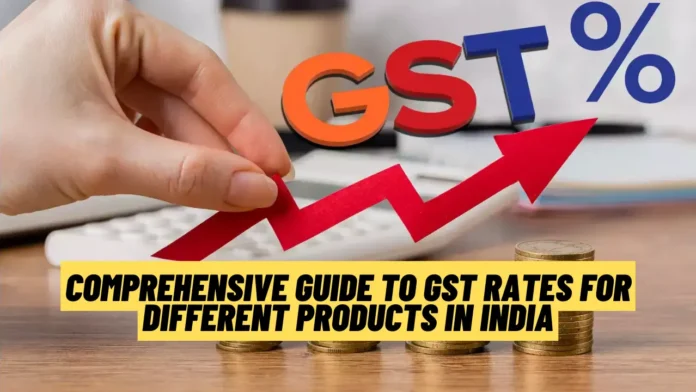The Goods and Services Tax (GST) in India, implemented on July 1, 2017, was a monumental step in reforming the country’s indirect tax system. By subsuming various state and central taxes, GST has streamlined tax processes and unified the Indian market. However, understanding the GST rates applicable to different products can be complex due to the multiple slabs. Here’s a detailed guide to help you navigate through the GST rates for various categories of products in India.
GST Rate Structure
The GST system in India is divided into several rate slabs:
- 0% (Exempt)
- 5%
- 12%
- 18%
- 28%
These rates apply differently to various products and services. Below is a detailed breakdown of GST rates across different categories.
GST Rates for Goods
1. Exempted (0% GST)
Goods under this category are either basic necessities or items of social importance, including:
- Fresh fruits and vegetables
- Unprocessed cereals and grains
- Milk and dairy products (excluding branded and packaged varieties)
- Books and educational material
- Organic manure and compost
- Khadi products sold by the Khadi and Village Industries Commission
- Prasadam provided by religious places
2. 5% GST
This lower rate is generally applied to essential goods such as:
- Branded and packaged food items like cereals, pulses, and flour
- Edible oils and sugar
- Tea, coffee, and spices
- Coal and peat
- Life-saving drugs and vaccines
- Transportation services (passenger)
- Fertilizers and agricultural equipment
- Handicrafts and handmade textiles
3. 12% GST
Goods under this category include:
- Processed food items (e.g., packaged fruits and vegetables, frozen foods)
- Cooking appliances and kitchenware
- School bags and other educational supplies
- Pharmaceuticals (other than life-saving drugs)
- Footwear priced above ₹1,000
- Bicycle and bicycle parts
- Furniture made from bamboo, cane, and rattan
- Solar water heaters and other renewable energy equipment
4. 18% GST
This is the most common GST rate and applies to a wide range of goods, including:
- Household appliances (e.g., air conditioners, refrigerators)
- Smartphones, tablets, and other electronic gadgets
- Hair oil, toothpaste, and soaps
- Apparel priced between ₹1,000 and ₹2,500
- Ice cream and other processed dairy products
- Paints, varnishes, and wall coverings
- Stationery items (excluding books)
- Travel services (business class flights)
- Ready-made garments
5. 28% GST
This rate is levied on luxury and demerit goods, such as:
- Motor vehicles and motorcycles (including luxury cars)
- Aerated drinks and soda
- Tobacco and tobacco products
- Luxury items like perfumes and beauty products
- High-end electronics like televisions above 32 inches
- Air conditioners and refrigerators with higher capacities
- Fireworks and pyrotechnic products
- Cement and building materials
- Gambling and betting services
GST Rates for Services
1. Exempted (0% GST)
Some services are exempt from GST to promote accessibility and affordability, including:
- Educational services provided by recognized institutions
- Healthcare services provided by hospitals and clinics
- Renting of residential properties
- Services by the Reserve Bank of India and government departments
- Charitable activities conducted by NGOs
2. 5% GST
Services under this category are typically essential or of public utility:
- Transport services (e.g., railways, economy flights, and public buses)
- Hotel accommodation with room tariffs between ₹1,000 and ₹2,500 per night
- Tour operators and travel agents
- Goods transportation services by road (other than courier services)
- Leasing of aircrafts and ships
3. 12% GST
This rate covers a mix of professional and technical services:
- Business class air travel
- Hotel accommodation with room tariffs between ₹2,500 and ₹7,500 per night
- Restaurant services without air conditioning or liquor license
- Consulting and advisory services
- Construction of affordable housing
- Renting of commercial properties
4. 18% GST
Most of the common services fall under this category:
- Telecom and data services
- Financial and insurance services
- Hotel accommodation with room tariffs above ₹7,500 per night
- Restaurants with air conditioning and/or liquor license
- Software services and IT consultancy
- Advertising and marketing services
- Maintenance and repair services
5. 28% GST
Luxury services and entertainment attract the highest GST rate:
- Gambling and betting
- Cinema tickets (above a certain threshold)
- Racing, including horse and motor racing
- Admission to theme parks and similar attractions
- Private cab services (luxury)
Recent Updates and Changes in GST Rates
GST rates are subject to periodic reviews and revisions by the GST Council to address economic changes and industry demands. Some notable recent changes include:
- Reduction in GST for electric vehicles and chargers from 12% to 5%.
- Lowering of GST on hotel accommodations to promote tourism.
- Reduced GST on job work services in the textile and diamond industry to boost exports.
Quick Review:
Q1.How are GST rates determined for different products?
Ans. The GST Council determines GST rates based on factors such as the product’s necessity, its impact on consumer prices, and revenue implications for the government.
Q2.Are GST rates uniform across all Indian states?
Ans. Yes, GST rates are uniform across India, ensuring a unified tax system for both goods and services.
Q3.Can GST rates change?
Ans. Yes, GST rates are reviewed periodically by the GST Council and can be revised based on economic needs and industry feedback.

